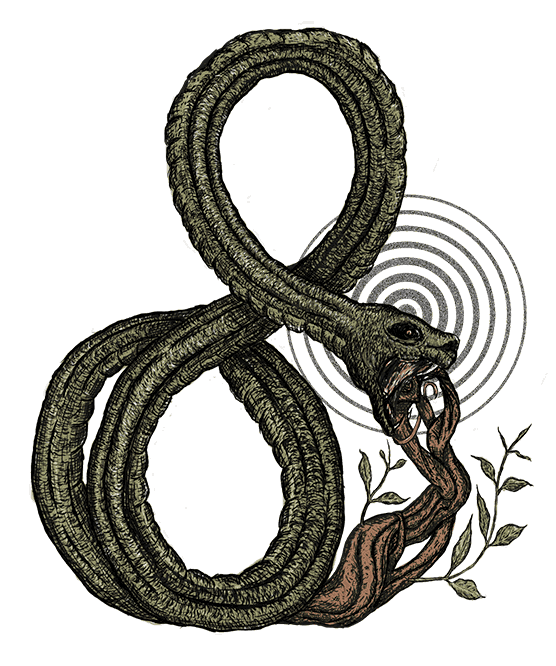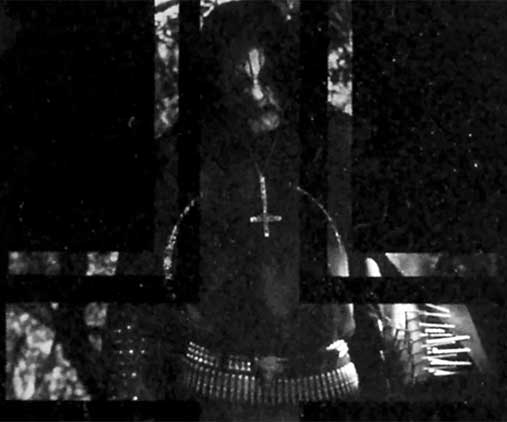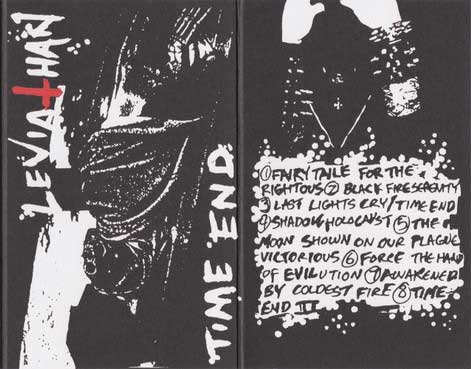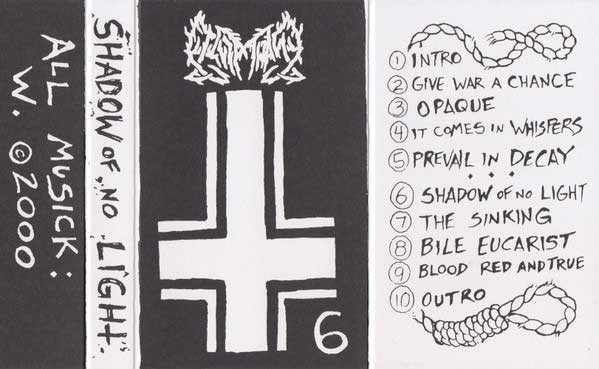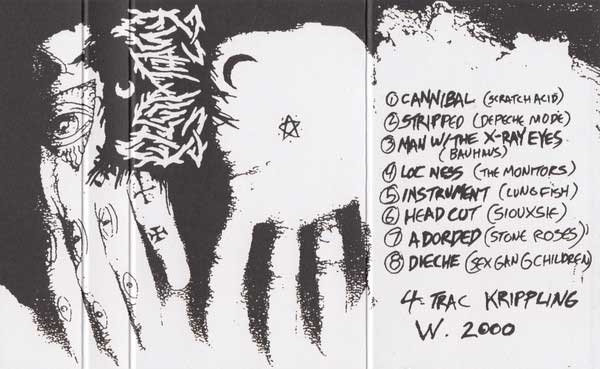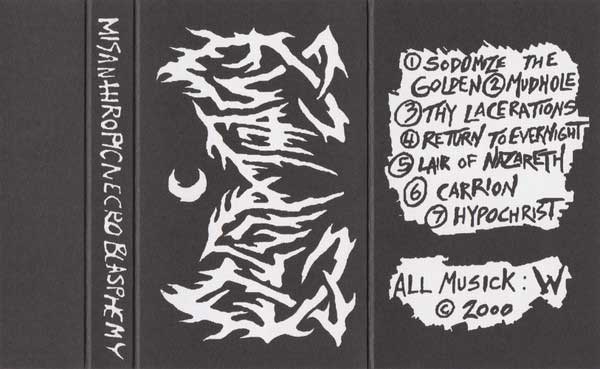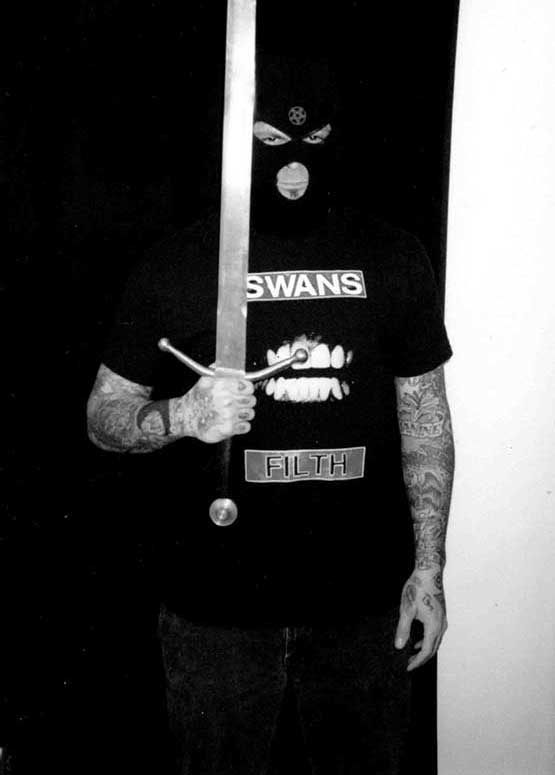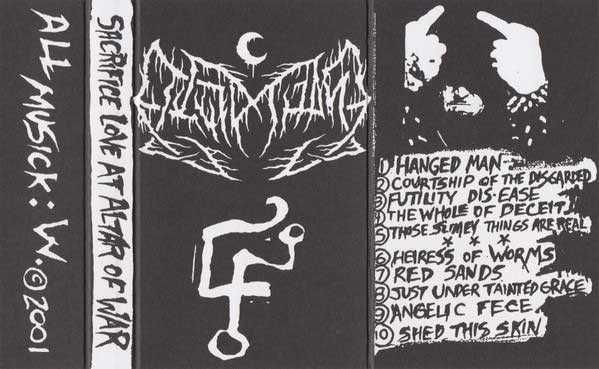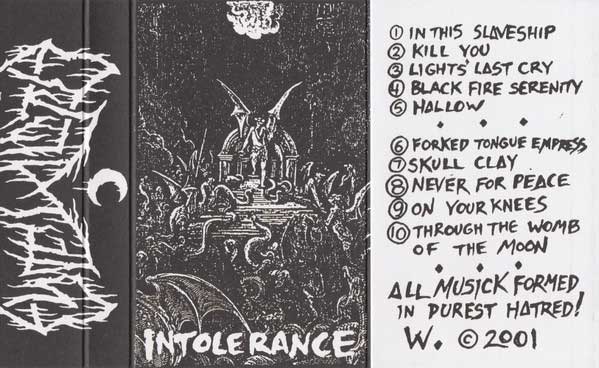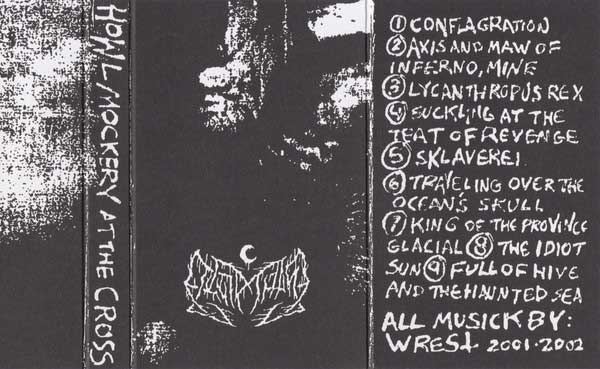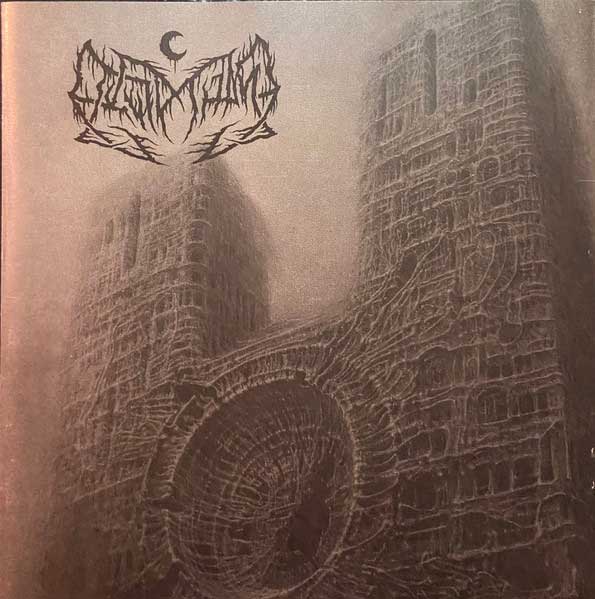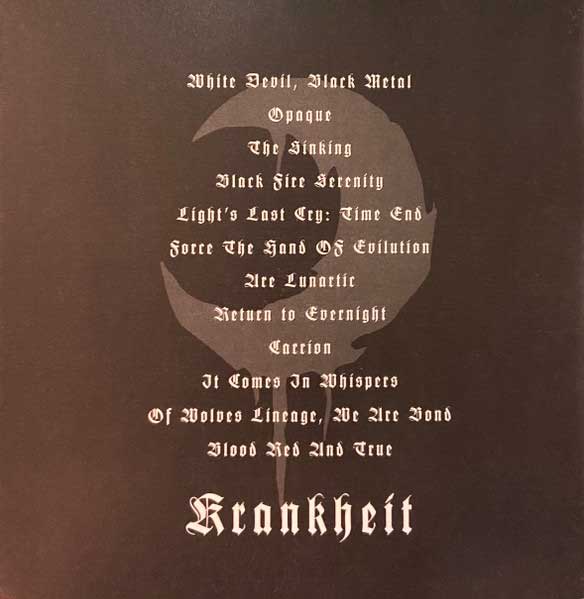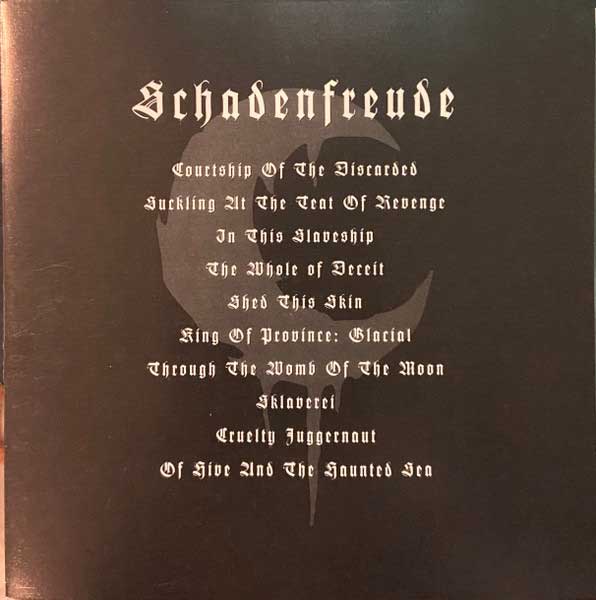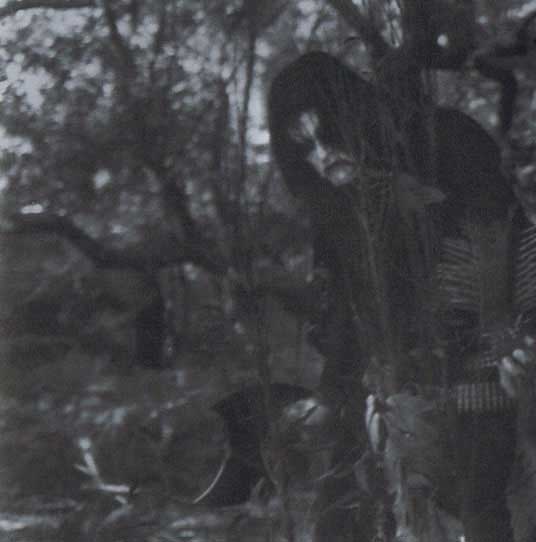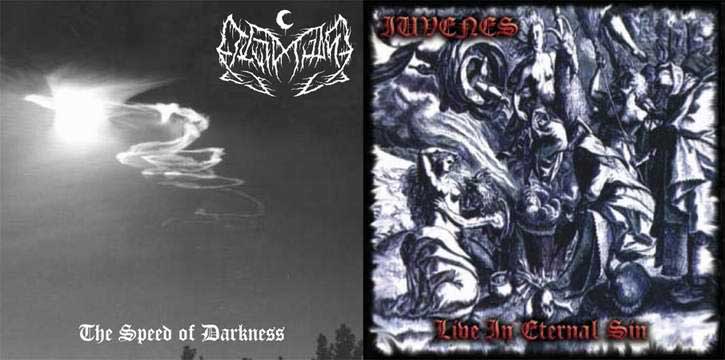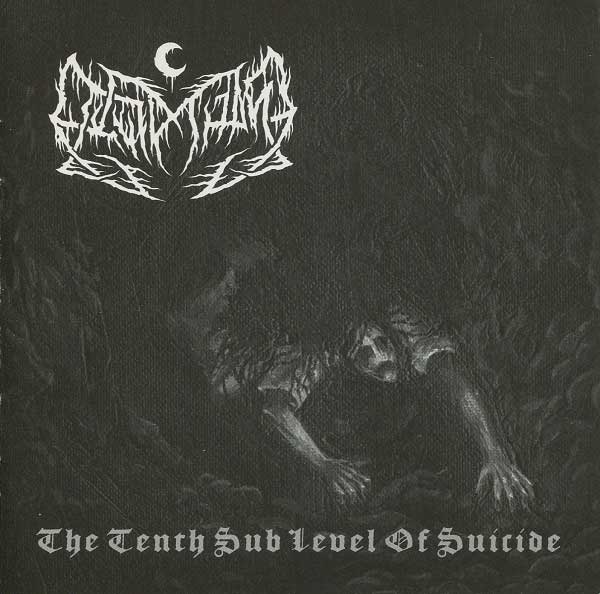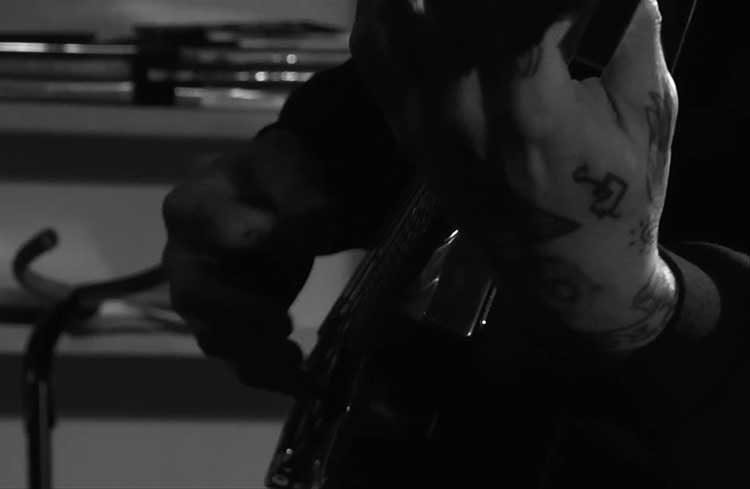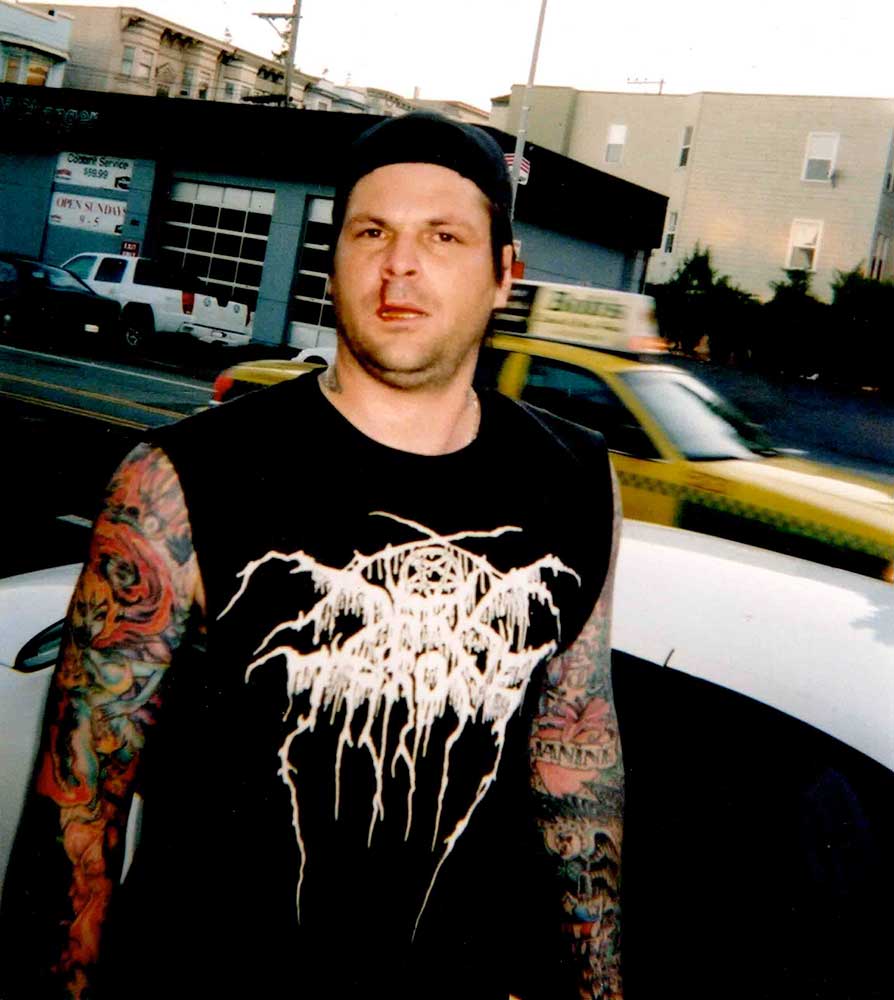Leviathan II
2024-04-16
by Niklas Göransson
As the new millennium dawned, Leviathan reared its head from the US black metal underground. After a torrent of obscure demos, Jef ‘Wrest’ Whitehead channelled shadowy whispers and gave form to The Tenth Sub Level.
JEF WHITEHEAD: In 1996, I moved into an apartment in Ashbury, San Francisco. Initially, I stayed in one room and rented out the other. I went through a few different roommates, but I had to kick out the last kid because he was a fucking weaner. I thought, ‘Okay, that’s it. No more – I’ll just pay the full rent myself.’ So, I made a music room out of the vacant space.
Since Jef couldn’t play a full drum set in his apartment, he opted for a Roland V-Pro digital kit. This acquisition, combined with a 1995 neck-through Paul Reed Smith guitar and an Ibanez short-scale bass, allowed him to start making crude recordings on his Tascam 424 analogue four-tracker.
JEF: I spent a lot of time in the music room. At first, I recorded stuff that was more… uh, I don’t even know how to describe it. I initially named the project RENFIELD – after Dracula’s little lackey – but soon changed it to LEVIATHAN. Those early tapes aren’t very good, though. The self-titled demo and “Time End” were just me figuring out the four-tracker and learning how to mix.
In 1998, Jef recorded LEVIATHAN’s self-titled debut demo. Before proceeding with the second, “Time End”, he bought a Line 6 POD – an amp simulator that could be plugged straight into the Tascam unit.
JEF: I’d start with drums and then do the first guitar. After recording the basslines, I dumped them and the drums onto one track, which meant I now had two tracks free for second guitar and vocals. If I needed samples, I’d put a microphone in front of my TV with a movie or whatever running through a VHS player. Obviously, getting it in sync using a four-tracker was very clumsy.
Primitive methods aside, “Time End” sounds pretty good for a late-90s demo; my only objection is the digital drums. Jef’s playing is technically impressive – “Last Light’s Cry” in particular – but it sounds distinctly inorganic. Nevertheless, the zealous passion wrought into those early recordings is clearly audible.
JEF: The whole LEVIATHAN thing became quite selfish, insular, and eventually all-encompassing – just like skateboarding when I was a kid. I’d wake up at seven, go get a coffee, and then head into the music room. I didn’t start any new projects in the morning, but I’d try to get through at least a guitar or a bass track before going to work.
Jef became a professional tattoo artist in July 1991. Around the time LEVIATHAN started, he worked for iconic American tattooer Ed Hardy at his studio, Tattoo City.
JEF: I was constantly thinking about song ideas on my way to and from the shop. Whenever possible, I’d leave early. I don’t drive, so I did a lot of walking. San Francisco is pretty small – it’s only about eight by eight miles. There were times when I would stop at a payphone to call my landline and hum melodies into the answering machine. Then, once I got home, I’d start learning to play them on guitar.
I’m assuming you were single at the time?
JEF: No, I actually had a girlfriend during this period, and LEVIATHAN became a big point of contention. I’d constantly get the ‘I was off today, why didn’t you call me?’ treatment. It’s like, ‘Sorry, I know I could’ve watched you try on different shoes for a few hours, but I’ve been in the music room .’
Did you attend any kind of social events?
JEF: If there was something I really wanted to see, I’d go to shows. And, I guess, the odd birthday party… but I’ve never been a huge socialite. Keep in mind that I spent most of my days tattooing, which is quite intimate. I’m touching someone, talking, and trying to make them feel comfortable. Also, being sober around drunks is just tedious; it’s as if everyone is underwater but I’m not.
With all this passion for music, were you never tempted to join an active band again?
JEF: Actually, for a while there, I jammed with this band BLACK GOAT. But those guys were… well, it didn’t really work out. One of them pretty much drank a twelve-pack throughout rehearsal and was hammered by the end of it. Their material wasn’t bad, though; John Gossard wrote some of it, and everything he does is genius. Gossard played with BLACK GOAT before he left to start WEAKLING.
San Francisco’s WEAKLING – who took their name from a SWANS song – formed in 1997. Two years later, they released an album called “Dead as Dreams” but disbanded shortly thereafter. These days, guitarist and vocalist John Gossard plays with DISPIRIT and CONSUMMATION.
JEF: I saw one of WEAKLING’s final shows and heard that their drummer, Sam – or Little Sunshine, as he calls himself – had just quit the band. I was actually gonna try out; Gossard and I talked about it. But then Josh, the second guitar player, also left and that was the end of WEAKLING.
The pace at which Jef produced demos is remarkable, especially considering that many of them – composition wise – are of album quality.
An in-depth interview specifically about these early recordings is included in “Shadow of No Light”, a box set released by Profound Lore in 2022. This cassette compilation was named after LEVIATHAN’s sixth demo tape, “Shadow of No Light” from the year 2000.
JEF: That was definitely a new benchmark. Some of the ideas on there almost gave me a ‘Eureka!’ feeling. Much of it came down to improved songwriting but also me figuring out the four-tracker a bit more. I was constantly trying out new stuff, making the best of my limited equipment. Leading up to “Shadow of No Light”, I found some weird gadget for DJs – a pad with a vocoder on it.
Vocoders allow for the manipulation of sound, particularly vocals, by blending them with synthesised tones to create unique, electronic textures.
While the early LEVIATHAN tapes boast many unorthodox and innovative qualities, what stands out the most to me is their complete lack of distribution. The first six or so demos weren’t heard by a soul outside Jef’s closest sphere.
JEF: I didn’t have time to worry about that. And to tell you the truth, I barely knew anyone in the local scene. I’d run into John Gossard once in a while, and he was pretty much the only person I talked to. My old tapes were not in any kind of circulation until the year 2000. By then, I’d become friendly with Stevil, the main metal buyer at Amoeba.
Amoeba Music is an independent record store with several locations in California – one of which was about five blocks from Jef’s place.
JEF: I gave Stevil a few of my demos, and he said, ‘Dude, you should try to sell them here!’ That was the first time LEVIATHAN had distribution. My tape deck didn’t have speed-dubbing, so I had to sit there recording cassettes in real-time. I could dub maybe five in one day and then sell them at Amoeba.
Was there an active black metal scene in San Francisco?
JEF: Sure, but I guess I wasn’t one of the cool kids. Besides, this whole scene thing… I’m not much of a joiner, so I’ve never seen myself as part of anything. Also, I got the impression that I wasn’t taken seriously because I didn’t play live. I actually still think that’s the case <laughs>. Nevertheless, a couple of locals liked my tapes, so I put them out there.
You mentioned in an old interview that a fellow San Francisco act had been slagging off LEVIATHAN – did you ever run into them?
JEF: There was one band with a pair of twins who were a bit goofy. It got back to me that they had some things to say. I saw ’em a few times, but there were no confrontations or anything; they seemed quite inconsequential to me. I remember wearing a POSSESSED hoodie, and one of them went, ‘Oh, that’s a cool…’ – and then said the name of some other band – ‘… shirt.’ And I’m like, ‘Okay, so now we’re discussing our dress choices, which is really dumb in the first place.’
The year 2001 saw Jef’s creativity kicked into overdrive. During the first six months, he wrote, recorded, and released three successive demos: “Seven & Slaveship”, “Nine (Inclement Derision)”, and “Ten”. By then, Jef had switched from dubbing his works on tape to burning CD-Rs.
JEF: “Seven…” is where I realised that I could record a third guitar on the vocal track whenever I wasn’t singing. Towards the end of “In this Slaveship”, I put in an E-Bow – kind of like a harmony. I just remembered that now! Ahem, quite the event for me, obviously; but to anyone else, it’s probably not gonna be too exciting.
Compared to LEVIATHAN’s previous output, “Nine (Inclement Derision)” is slower and more experimental, with some material clearly influenced by SWANS. To accommodate the new sound, Jef tried out a different guitar tuning: drop B.
JEF: MELVINS use drop B, which is how I got the idea. Buzz Osborne (MELVINS) once said that he started tuning to drop B because he wanted to learn Neil Young’s “Cinnamon Girl”. LEVIATHAN is mostly in drop D; there are only a couple of songs in the standard tuning, E. Some people experiment with various tuning setups, but I never did a lot of that since you must then adjust the bass accordingly.
In mid-2001, Jef put together a cassette compilation called “Sacrifice Love at the Altar of War”, showcasing a selection from LEVIATHAN’s latest three demos.
As the year drew to a close, he released another demo, “Intolerance”, followed by “Howl Mockery at the Cross” in early 2002. The eleventh and twelfth LEVIATHAN demos are so different from “Nine” that they could easily be mistaken for a completely different band.
JEF: That’s probably owed to whatever I was listening to at the time, or different things I wanted to try out. There were a couple of months between them, I guess; I don’t remember. Yeah, I know, I should’ve listened to this stuff before we talked, but I’m dealing with a seven-year-old going on nineteen here.
Later the same year, “Howl Mockery at the Cross” was succeeded by LEVIATHAN’s thirteenth demo, “White Devil, Black Metal”.
JEF: You know, I’d be curious to see how that title would go over now. To me, that’s kind of like owning what you’ve been called by others. And it sounded… well, it still sounds good to me; it’s only racial if you make it so. Actually, the first LEVIATHAN shirts – which I printed myself – had the logo on the front and ‘White devil, black metal’ written down the sleeve. I think I made twenty of them. About a year ago, a friend of mine said, ‘I still have that thing!’ I’m like, ‘You work in Oakland, be careful!’ <laughs>
“White Devil, Black Metal” marked additional improvements in both sound quality and musical depth, infused with the vibrant, ambient textures that define the LEVIATHAN of this era. Observant listeners will recognise “Cruelty Juggernaut” as a more refined rendition of “V” from the third demo.
JEF: Oh, I do remember “Cruelty Juggernaut” – I’ve done that song a couple of times. It starts with double kicks and four chords, then mellows out with volume swells on one guitar and finger-tapping on the other, right? To me, those vocals sound like Rozz Williams from CHRISTIAN DEATH. Also, the lyrics are expressed through the perspective of a woman… which you can probably tell, seeing as how I say ‘she’ and ‘her’.
After Jef secured distribution via Amoeba, he was approached by a local label called tUMULt. Its proprietor, Andee Connors – part-owner of the classic San Francisco record store Aquarius – proposed a LEVIATHAN demo anthology.
“Verräter” was released by tUMULt in October 2002. The compilation spans two discs – one based on LEVIATHAN’s tape era and the other from the age of CD-R, beginning with “Seven & Slaveship”.
JEF: Andee said, ‘Let’s bring your recordings to my friend and we’ll put ’em on a computer.’ That’s how we mastered the compilation. It sold pretty well from both Aquarius and Amoeba; I remember going to a show and the first thing John Cobbet and Aesop Dekker from LUDICRA said to me was that they dug “Verräter”. It also piqued the interest of people in my personal life. Like, ‘Maybe you’re not just banging pots and pans together in your bedroom after all.’
Any response from outside San Francisco?
JEF: Not really. A few tattooers I knew across the country liked it. Whenever someone expressed interest, I’d send them my shit. Most people seemed to be more into the old RENFIELD stuff, though; probably due to the lack of blast beats and because the vocals weren’t as crazy. It found a broader audience, so to speak. A big portion of that material evolved into LURKER OF CHALICE.
It’s crazy to consider that Jef had a side-project, LURKER OF CHALICE, parallel to the torrent of LEVIATHAN releases. He recorded two demos, “L.O.C.” in 2001 and “Lurker of Chalice” the following year.
JEF: Part of the reason I started LURKER was that I became obsessed with “Astral Tenebrion” by the English solo project BENIGHTED LEAMS. It was always in the bargain bin; I don’t think people really got the music. There’s something about his harmonies that makes them sound very unhinged. It has a lot of clean vocals, and then when his voice got pitchy, he’d lower the volume so it wouldn’t be as noticeable <laughs>. But as a whole, that record is amazing.
In the fall of 2002, Jef recorded LEVIATHAN’s fourteenth demo: “The Tenth Sub Level of Suicide”. Encouraged by the modest but largely positive reception to “Verräter”, he contacted a few labels.
JEF: I sent it to War Hammer Records, Mike Meacham’s (LOSS) old label. I also got in touch with No Colours from Germany, Moribund Records, and a couple of others. Moribund were the first to respond – and me being very naive, I jumped on it straight away. I knew they’d released JUDAS ISCARIOT, who I was a huge fan of.
Formed in 1992, US black metal band JUDAS ISCARIOT was the solo project of Akhenaten – an underground stalwart who also ran Breath of Night Records.
JEF: Moribund had a band from Portland called THY INFERNAL. One of those dudes, Kevin Schreutelkamp, is in most of the good acts around here now, as well as INCANTATION and BLASPHEMY live. Anyhow, No Colours wrote me back, but I told them I’d just signed with Moribund. They were like, ‘Okay, how about a IUVENES split?’
LEVIATHAN’s split with Polish black metal band IUVENES, “Live in Eternal Sin / The Speed of Darkness”, was released by No Colours Records in mid-2003. Jef’s contribution features stellar material, but the sound leaves a bit to be desired.
JEF: Wait, what? The sound isn’t very good? Hm. By then, I’d started working with two friends of Andee’s – Daniel Voss and Drew Webster, or Drucifer. Both of them went to a school in Emeryville, learning how to be studio engineers. The split was probably done at Drew’s house. I know the production is pretty muddy on the first track, but it’s interesting you’d say that.
After almost twenty releases over five years, LEVIATHAN’s debut album, “The Tenth Sub Level of Suicide”, was unleashed upon the world by Moribund Records in September 2003. Jef recycled the title of his fourteenth demo and material from the fifteenth, “XV”.
JEF: Some of the songs on there… it’s not that they’re so great, but like, ‘How did I do that? Where did that even come from?’ I redid the whole of “XV” except the last song. I just couldn’t nail the drums and then got frustrated. I also recall really struggling with the basslines. Working with a four-tracker is kind of like a game we kids used to play in the 80s, ‘Simon says’.
Essentially, the game entails carrying out a sequence of instructions – players who screw up must start again from the beginning.
JEF: There’s plenty of that with a four-tracker. Lots of cussing at yourself, frustration, and you wanting to throw your guitar across the room. When the recording was done, we – myself, Daniel, and Drew – transferred my tapes to a computer, mixed the songs on a big studio soundboard, and then put them back in a laptop to finalise everything. That album was a big deal for me. It was also the first time I decided to handle all the artwork myself.
“The Tenth Sub Level of Suicide” features seriously harrowing cover art – incredibly apt as the visual representation of this record.
JEF: It was designed to have a subterranean feel; I wanted to capture that panicked sense of being trapped under… well, whatever you’re under. And you try desperately to claw yourself out again. But are you really trying to get out? Sometimes, misery breeds complacency – which I can attest to. And then there are people in my life who go, ‘Oh Jef, don’t be such a black cloud. You’re so mopey.’
Do you think they might have a point?
JEF: Probably. But it’s like… I am who I am – and the reason I can do these things is because there have been many periods in my life when art was all that I had. My music means the absolute world to me. And unfortunately, it got lumped in with this ‘depressive suicidal black metal’ shit, which I fucking hate. I want nothing to do with it.
In fairness, that categorisation isn’t entirely unreasonable for an album called “The Tenth Sub Level of Suicide” – especially with booklet slogans like ‘To the first gash you rape into your own skin!’
JEF: That was all hyperbole put in there by Moribund – not me. Suicide is one lyrical theme of several but has never been in the majority. Obviously, I’ve written about misery and depression and so on, but the concept of ending your own existence came from real-life events. There were a couple of times when the shadows in the corners of my apartment literally came alive.
Were you still sober?
JEF: Dead sober. My music room seemed to awaken; the shadows started moving and morphing and I heard voices. Honestly, the first thing that struck me about the experience was my complete lack of fear. I was kinda like…. ‘Okay, then.’ A few whispers I could make out actually became lyrics on “The Tenth Sub Level…”. I can’t recall which song now, but something along the lines of, ‘Come with us, you belong to us.’
“Sardoniscorn” has a part that goes, ‘Come with us, you belong to us – kill yourself, you deserve this.’
JEF: You must understand that I’ve dealt with suicidal ideation ever since I was a kid. I doubt there’s anyone who hasn’t at least thought about it when they’ve been so utterly beaten down by life or by their own head. Of course, I’ve met people who’ve said, ‘Nope, never crossed my mind’, but I find this hard to believe. Writing songs about the act of suicide was my own way of investigating it.
Would you say that you got anything positive out of this?
JEF: Sure. I think black metal, or dark music in general, can be cathartic – but also a way of doing some homework on yourself, if that makes sense. To this day, I still get messages from kids telling me I’ve helped them deal with all kinds of shit. ‘If it wasn’t for LEVIATHAN, I’d be dead.’ And it never ceases to amaze me because that’s not at all what I intended <laughs>.
METALLICA’s album “Ride the Lightning” contains a depression-themed track called “Fade to Black”. Upon its release in 1984, the song faced accusations of glorifying suicide. However, James Hetfield has stated on many occasions that he still, decades later, receives letters from fans saying it got them through a rough patch or made them feel as if they weren’t alone in the world.
JEF: I can’t explain how, but I do think that black metal – or those tones and expressions – definitely saved me more than once. Again, there were many times when it was all I had. No matter what else went on in life, I could always find sanctuary in my music room and pour everything I had into it. And I’m just thinking now… maybe that’s why there are songs I just won’t listen to. I condensed certain sentiments in there and don’t need to investigate them further.
Following “The Tenth Sub Level of Suicide”, LEVIATHAN attracted considerable curiosity from the underground metal scene. Forums of the era were rife with speculation about the mysterious Wrest who’d produced this tortured music so prolifically – completely under the radar – for several years.
JEF: I didn’t adopt the Wrest moniker immediately. Since I’d already used ‘W’ – referring to my last name, Whitehead – on a couple of demos, I had to think of something beginning with the same letter.
As someone who values privacy, wasn’t this surge of interest around your person a bit unnerving?
JEF: It might’ve been if I’d noticed; I wasn’t really paying attention. I responded to interviews that Moribund sent me, or whatever, but I didn’t own a computer. I had to visit internet cafés, and I could barely type, too. Remember my answers to your initial attempt – the interview that went unpublished? Very short. But as you’ve probably noticed by now, I do ramble if I’m on the phone.
That is far preferable to snarky, one-sentence responses.
JEF: <laughs> Honestly, the whole interview thing never made much sense to me: it shouldn’t really matter who’s making the music. I was also trying to let the sounds and artwork speak for themselves; I wanted to separate LEVIATHAN from tattooing and the rest of my private life. Obviously, things have changed since then.
How did your peers in the US black metal scene react?
JEF: Many of them didn’t like “The Tenth Sub Level…”, but I think much of that was due to all the attention and magazine coverage it got. A few months after the album came out, I happened to be in New York City when I heard that ANTAEUS were playing. They are a huge deal for me, so I had to go.
In the spring of 2004, French black metal band ANTAEUS toured the US with KRIEG and DEMONCY.
JEF: That’s when I first met Neill Jameson (KRIEG), as well as Richard from Vinland Winds – rest in peace. And Blake Judd. I’d actually contacted Blake the year before… mind you, this is back when he’d write ‘komrade’ with a K and all that. I wrote to him after NACHTMYSTIUM released an EP with a JUDAS ISCARIOT cover. I think Akhenaten played on it.
NACHTMYSTIUM’s self-titled 2003 EP has a cover version of JUDAS ISCARIOT’s “Gaze upon Heaven in Flames”. Akhenaten is credited with engineering and mixing.
JEF: Blake and I talked online and then met in person at the gig. We were outside smoking when this kid came up to me and went, ‘Tenth Sub Level!’ And I’m like, ‘Alright. I’m in the middle of a conversation here, but whatever.’ Then he asks, ‘Do you think you’re the new hope for US black metal?’ <laughs> I just looked at Blake, shaking my head. ‘Uh, no dude.’ It was fucking embarrassing. But that’s why Blake wanted to start TWILIGHT – because XASTHUR and LEVIATHAN got more attention than NACHTMYSTIUM.
log in to keep reading
The second half of this article is reserved for subscribers of the Bardo Methodology online archive. To keep reading, sign up or log in below.
